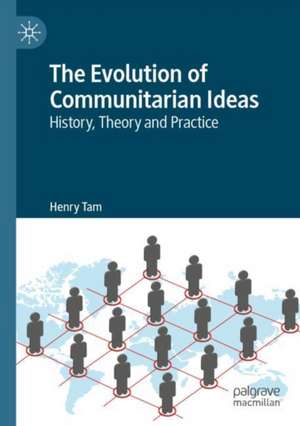The Evolution of Communitarian Ideas: History, Theory and Practice
Autor Henry Tamen Limba Engleză Paperback – 13 noi 2020
| Toate formatele și edițiile | Preț | Express |
|---|---|---|
| Paperback (1) | 385.84 lei 43-57 zile | |
| Springer International Publishing – 13 noi 2020 | 385.84 lei 43-57 zile | |
| Hardback (1) | 501.55 lei 43-57 zile | |
| Springer International Publishing – 13 noi 2019 | 501.55 lei 43-57 zile |
Preț: 385.84 lei
Nou
Puncte Express: 579
Preț estimativ în valută:
73.84€ • 76.62$ • 61.72£
73.84€ • 76.62$ • 61.72£
Carte tipărită la comandă
Livrare economică 17-31 martie
Preluare comenzi: 021 569.72.76
Specificații
ISBN-13: 9783030265601
ISBN-10: 3030265609
Pagini: 268
Ilustrații: V, 268 p. 1 illus.
Dimensiuni: 148 x 210 mm
Greutate: 0.36 kg
Ediția:1st ed. 2019
Editura: Springer International Publishing
Colecția Palgrave Macmillan
Locul publicării:Cham, Switzerland
ISBN-10: 3030265609
Pagini: 268
Ilustrații: V, 268 p. 1 illus.
Dimensiuni: 148 x 210 mm
Greutate: 0.36 kg
Ediția:1st ed. 2019
Editura: Springer International Publishing
Colecția Palgrave Macmillan
Locul publicării:Cham, Switzerland
Cuprins
Chapter 1. The Roots of Communitarian Ideas.- Chapter 2. The Emergence of Communitarian Challenges: 1400s-1600s. Chapter 3. Towards Enlightened Communities: the 18th century.- Chapter 4. Beyond Gemeinschaft & Gesellschaft: 19th to early 20th century.- Chapter 5. Critiques of Depersonalisation: 1920s-1980s.- Chapter 6. Communitarianism Articulated: 1989-2001.- Chapter 7. Tackling Community Disempowerment post-2001.- Chapter 8. Tomorrow’s Communities.
Notă biografică
Henry Tam is Director of Question the Powerful. He has been Lecturer at the University of Cambridge, Visiting Professor at Birkbeck, University of London, and Head of Civil Renewal in the UK Government. His published books include Communitarianism (1998), Time to Save Democracy (2018), and Whose Government is it? (2019).
Textul de pe ultima copertă
This book deals with three key questions about communitarian ideas: how to distinguish what constitutes communitarian thinking; what lessons to take from the historical development of communitarian arguments; and why their practical implications are relevant in devising reforms at the local, national, and global levels. Each chapter covers a distinct period, with a critical exposition of the leading thinkers of that time who contributed to communitarian philosophy and politics. Beginning with an examination of the rise of proto-communitarian ideas in classical Western and Eastern thought, the book closes with a review of communitarian responses to the emergent social and technological changes in the 21st century. Readers will learn about the core features and significance of communitarian theories and practices in relation to morality, education, the economy, freedom and security, community development, and democratic governance; and how they compare and contrast with other ethical andintellectual outlooks.
Henry Tam is Director of Question the Powerful. He has been Lecturer at the University of Cambridge, Visiting Professor at Birkbeck, University of London, and Head of Civil Renewal in the UK Government. His published books includeCommunitarianism (1998), Time to Save Democracy (2018), and Whose Government is it? (2019).
Caracteristici
Offers an up-to-date account of this philosophy and of the main historical ideas that influenced it Builds on the author’s experiences in implementing communitarian principles within government to discuss the practicalities of the ideas Enables students and lecturers to compare and contrast communitarianism with other schools of thought in relation to the critical issues covered
